Q1) Reluctance motor is basically ?
a) a DC shunt motor
b) a servo motor
c) a DC series motor
d) a single-phase synchronous motor
Solution
Reluctance motor:
- A single-phase reluctance motor is basically the same as the single-phase salient pole synchronous cage type induction motor, hence it is also called self-starting type synchronous motor
- The stator of the motor has the main and auxiliary winding
- The stator of the single-phase reluctance and induction motor is the same
- The rotor of a reluctance motor is a squirrel cage with some rotor teeth removed in certain places to provide the desired number of salient rotor poles
- The rotor is of unsymmetrical magnetic construction in order to vary reluctance path between stator and rotor
- It requires no D.C. field excitation for its operation
- The direction of rotation can be reversed ordinarily.
Q2) Which of the following motors is operated either on direct or single-phase AC supply and produces approximately the same speed and output?
a) Universal motor
b) Capacitor start and capacitor run induction motor
c) Capacitor start induction run motor
d) 1-phase series motor
Solution
Universal Motor
- The motors which can be used with a single-phase AC source, as well as a DC source of supply and voltages, are called Universal Motor.
- It is basically a single-phase DC series motor.
- On reversing the polarity of the line terminals of a DC Series Motor, the motor will continue to run in the same direction.
- A universal motor is a commutation type motor.
- The universal motor produces approximately the same speed and output when operated either on a direct or single-phase AC source.
Important Points
The universal motor can work on both AC and DC.
However, a series motor that is mainly designed for DC operation, it works on single-phase AC supply suffers from the following drawbacks.
- The efficiency becomes low because of hysteresis and eddy current losses.
- The power factor is low due to the large reactance of the field and the armature windings.
- The sparking at the brushes is in excess.
To overcome the above drawbacks, certain modifications are made in a DC series motor so that it can work even on the AC current.
Applications of Universal motor
- Portable drill machine
- Used in hairdryers, grinders and table fans
- It is also used in blowers, polishers and kitchen appliances
- It is used for the purposes where speed control and high values of the speed are necessary
Q3) In 1-ϕ IM if the slip of motor is S with regard to the forward rotating flux, then its slip with regard to the backward rotating flux will be ?
a) S-1
b) S
c) 1-S
d) 2-S
Solution
Concept:
- In 1-ϕ IM if the slip of the motor is S with regard to the forward rotating flux, then its slip with regard to the backward rotating flux will be 2 - s.
- In s single phase induction motor,A flux, φ can be resolved into two components and -
- let us call these two components of flux as forwarding component of flux ϕf and the backward component of flux ϕb. The resultant of these two components of flux at any instant of time gives the value of instantaneous stator flux at that particular instant. ϕr = ϕf+ϕb
- The forward flux has a slip of s and the backward flux has a slip of 2 - s.
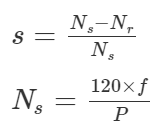
Where, Ns = Synchronous speed in rpm
Nr = Rotor speed in rpm
f = Supply frequency in Hz
P = Number of poles
Q4) The coil of shaded pole induction a single-phase induction motor is highly ________ ?
a) inductive
b) capacitive
c) repulsive
d) resistive
Solution
Shaded Pole Induction Motor
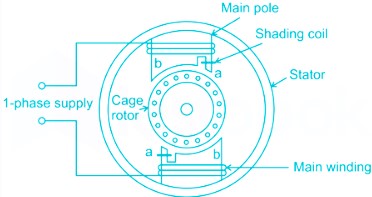
- The shaded pole induction motor is simply a self-starting single-phase induction motor whose one of the poles is shaded by the copper ring.
- The copper ring is also called the shaded ring. The shaded ring is highly inductive in nature.
- This copper ring acts as a secondary winding for the motor.
- The shaded pole motor rotates only in one particular direction, and the reverse movement of the motor is not possible.
- When the supply is connected to the windings of the stator, the alternating flux induces in the core of the rotor. The small portion of the flux link with the shaded coil of the motor because it is short-circuited.
- The variation in the flux induces the voltage inside the ring because of which the circulating current induces in it.
- The circulating current develops the flux in the ring which opposes the main flux of the motor.
- The flux induced in the shaded portion of the motor and the unshaded portion of the motor has a phase difference. The main motor flux and the shaded ring flux are also having a space displacement by an angle of 90°.
- As there is time and space displacement between the two fluxes, the rotating magnetic field induces in the coil.
- The rotating magnetic field develops the starting torque in the motor.
- The field rotates from the unshaded portion to the shaded portion of the motor.
Q5) In a capacitor start induction run motor, when motor reaches to ________ of full speed, the centrifugal switch S opens and cuts out capacitor from supply ?
a) 25%
b) 75%
c) 100%
d) 50%
Solution
Shaded Pole Induction Motor
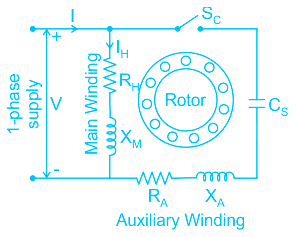
- The capacitor-start induction motor consists of a main or running winding (H) and an auxiliary winding (A). Both the windings have the same number of turns.
- A starting capacitor (Cs) is connected in series with the starting winding as shown in the circuit diagram above.
- The value of the starting capacitor is so chosen that the starting current IA leads the main winding current IH by an angle of 90°.
- As soon as the speed of the motor reaches about 75% of the synchronous speed, then the centrifugal switch isolates the auxiliary winding from the motor circuit. Now, the motor operates as a 1-phase induction motor and continues to accelerate till it reaches the normal speed.
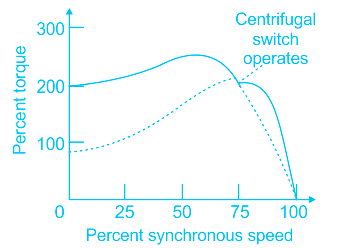
Q6) In hysteresis motor, hysteresis torque remains practically _______ ?
a) Variable
b) Fluctuating
c) Constant
d) Zero
Solution
Concept
- A hysteresis motor is a synchronous motor
- It has a cylindrical rotor and works on hysteresis losses induced in the rotor of hardened steel with high retentivity.
- It is a single-phase motor
- It has a rotor is made of ferromagnetic material with non-magnetic support over the shaft.
- A hysteresis motor is constructed of five main components Stator, Single-phase stator winding, Rotor, Shaft, Shading coil
- The stator of the hysteresis motor has a main winding along with an auxiliary or starting winding. When the stator winding is fed from a single-phase supply, it produces a synchronously revolving magnetic field.
- In the hysteresis motor, hysteresis torque remains practically constant
- The revolving magnetic field is accomplished by using a permanent split capacitor type construction of the motor. As a result, both the starting and the main windings of the motor remain connected in the motor circuit during running as well as at starting.
- The value of the capacitor is so adjusted that it results in a flux revolving at synchronous speed. The rotor of the hysteresis motor consists of a smooth cylinder of magnetically hard steel, without winding or rotor teeth.
- In the hysteresis motor, hysteresis torque remains practically constant
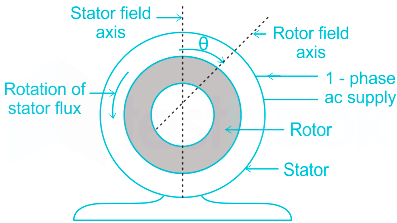
Q7) Which of the following machines has high power factor and efficiency under running conditions ?
a) Capacitor-start single-phase induction motor
b) Two-value capacitor single-phase induction motor
c) Resistance split-phase single-phase induction motor
d) Shaded-pole single-phase induction motor
Solution
Two-value Capacitor single-phase Induction Motor
This motor has a cage rotor, and its stator has two windings namely the main winding and the auxiliary winding. The two windings are displaced 90° in space. The motor uses two capacitors CS and CR. In the initial stage, the two capacitors are connected in parallel.
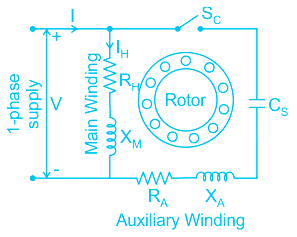
- RM, XM = Main winding resistance and reactance.
- RA, XA = Auxiliary winding resistance and reactance.
- IA = Current through the auxiliary winding
- IM = Current through the main winding
- V = 1-ϕ supply voltage
- CS = Starting capacitor
- CR = Running capacitor
- ϕ = Angle between main winding current and auxiliary winding current.
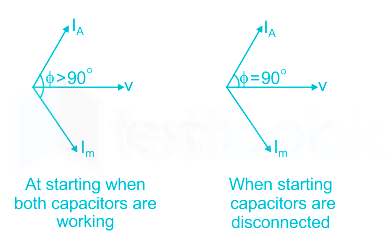
- During starting of motor CS, CR both working so, ϕ is greater than 90°
- During the running of motor only CR is working so, ϕ equals 90°
- Due to this, it has a high power factor and efficiency under running conditions.
 Additional Information
Additional Information
Applications:
1. Two-value capacitor motors are used for loads of higher inertia that require frequent start.
2. These are used in pumping equipment.
3.These are used in refrigeration, air compressors, etc.
Q8) Starting current of a straight type repulsion motor is about ________ its full load value ?
a) 3 to 4 times
b) half
c) the same as
d) 7 to 10 times
Solution
Repulsion induction motor:
- Generally, the repulsion induction motor consists of a single-phase stator winding, as a repulsion-start induction motor, but it consists of two separate independent windings on the rotor in common slots.
- The inner winding is a squirrel cage winding with rotor bars permanently short-circuited while the outer winding is a commutator or repulsion winding similar to a dc machine armature winding
- When the motor starts the squirrel cage winding, due to its high reactance, has no effect and the motor starts as a repulsion motor.
- As the motor speeds up, the current shifts from the outer winding to the inner winding owing to decreasing reactance of the inner winding with the increasing speed, and the squirrel cage winding comes into action.
- At normal speed, both of the windings develop torque and the output of the motor is the combined output of both of the rotor windings.
- The starting torque is about 2.5-3 times the full-load torque and its starting current is about 3-4 times the full-load current.
- The commutation of the motor is good at all speeds. No-load speed is above synchronous speed but normal speed is somewhat below synchronous one. No-load current is rather high, sometimes greater than the full-load current.
Speed torque characteristics of Repulsion induction motor:
The speed-torque characteristics of the repulsion induction motor are shown below, which are drawn between the percentage of speed and the percentage of full load torque. The speed-torque characteristics of the repulsion induction motor resemble the characteristics of the DC compound motor.
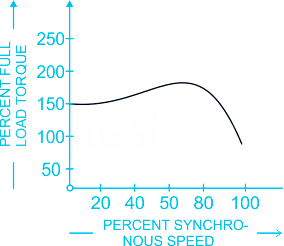
Q9)
Identify whether the following statements are true or false.
1. Capacitor start motors are more costly than split-phase induction motors.
2. In two-value capacitor motors, the two capacitors are connected in parallel at the starting.
a) Statement 1 is false and statement 2 is true
b) Statement 1 is true and statement 2 is false
c) Both the statements are false
d) Both the statements are true
Solution
Table of Data
| Particular | Split Phase /Resistance Motor |
Capacitor Start Induction Run Motor | Capacitor Start, Capacitor Run Motor | Shaded Pole Motor |
| Power Factor | 3 | 2 | 1 | 4 |
| Starting Torque (%fl) | 150% to 200% | 300% to 450% | 200% | Very less |
| Rating | 60 W – 250 W | 120 W to 7.5 kW | Up to same as CSIR | 40 Watt |
| Centrifugal Switch | Yes | Yes | Only in 2-value capacitor motor are connected in parallel at the starting. | No |
| Cost | 2 | 3 | 4 | 1 |
| Application | In frequent starting, low inertia | Frequent starting High inertia | Frequent starting High inertia | Very low inertia |
| Centrifugal Switch | present | present | present | Not present |
Q10) Tapping field speed control method is used in a/an ______ for speed control?
a) AC series motor
b) capacitor start capacitor run motor
c) repulsion motor
d) universal motor
Solution
Speed control methods of universal motor
- 1.) Field Tapping Method
- A hysteresis motor is a synchronous motor
- It has a cylindrical rotor and works on hysteresis losses induced in the rotor of hardened steel with high retentivity.
- It is a single-phase motor
- It has a rotor is made of ferromagnetic material with non-magnetic support over the shaft.
- A hysteresis motor is constructed of five main components Stator, Single-phase stator winding, Rotor, Shaft, Shading coil
- The stator of the hysteresis motor has a main winding along with an auxiliary or starting winding. When the stator winding is fed from a single-phase supply, it produces a synchronously revolving magnetic field.
- In the hysteresis motor, hysteresis torque remains practically constant
- The revolving magnetic field is accomplished by using a permanent split capacitor type construction of the motor. As a result, both the starting and the main windings of the motor remain connected in the motor circuit during running as well as at starting.
- The value of the capacitor is so adjusted that it results in a flux revolving at synchronous speed. The rotor of the hysteresis motor consists of a smooth cylinder of magnetically hard steel, without winding or rotor teeth.
- In the hysteresis motor, hysteresis torque remains practically constant






No comments:
Post a Comment